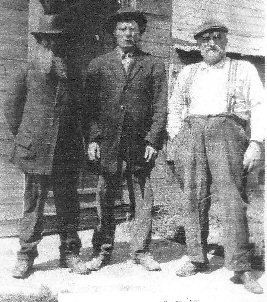
The Namur Tragedy
Submitted by Annabel Reynard-LeClaire,(#347), Tucson, AZ
In the beginning of April, 1936, the county of Papineau in the Outaouais is in shock following the tragedy in the village of Namur, some fifty kilometers north of Montebello. At dawn on the 6th, the villagers watch helplessly as a fire burns down the house of Léon Leclair, a respectable man in his eighties, who lived with the Dudevoirs, a couple in their sixties. All three were deaf and devout Mormons. Villagers started to fear the worst when the latter were not seen around the smoldering ruins.
Buried in the ashes, the burnt bodies of the two men were found, including the bones of those probably belonging to the woman. The body of Leclair was recognizable because of his long beard, which miraculously did not go up in flames. There was a rope around his neck. It was no secret that the Dudevoirs had money, the fruit of the sale of their farm, which they owned before moving to Namur. It seems that, after tying up the occupants, the assailants stole the money and then set the house on fire.
The authorities reacted immediately. Louis Jargaille, chief of the Provincial Police, was sent to the scene of the crime. The Montreal Press followed and there seemed to be more to the "Mysterious Tragedy of Namur". Following the investigation, which lasted several days, the Chief of Police stated that his men were searching for a man called Omer Girard, 35 years old, ex-con and a member of a religious sect entitled Les Crucifiés (The Crucified). Girard's brother, Ovila, founded the sect with a man called Gaumont. The latter, who lived in the region, spent time with the Dudevoirs in the hope of converting them. According to witnesses, Omer was in their home the night before the fire and hastily left the region the following morning in the direction of Montreal. He lived with his wife at his father-in-law's nearby home and earned a scarce living as a lumberjack.
On April 14th, the police stated, that having caught the fugitive in Montreal's red light district, they wanted to thank the newspaper crews and the general public for their co-operation in the case. Jargaille stated: "More than 60 provincial officers continuously searched the district for Girard. The latter, who knew he was being stalked, didn't sleep in the same place for more than two consecutive nights. All exits out of the city were guarded. There was no way he could escape us... In the past several days, we have received more than a thousand phone calls, some offering precious information ...".
It was at this time that it became a known fact that the fugitive's past was quite dark. He had been accused of several robberies with violence and was once condemned to thirty lashes with a nine-stemmed whip. In 1930, he was condemned to five years in prison for a hold-up but was released in 1933, after testifying at the Saint-Vincent-de-Paul rioter's trial. Several months later, he was apprehended for rape but was found not guilty because of lack of evidence. His presumed victim was a sixteen-year-old girl that he ended up marrying soon after. In delivering his release statement, the judge said: "The rope is what awaits you. One fine day, the courts will sentence you to death. You are an evil man and a gallows bird". The judge's prediction took only three years to come true.
The hearing of the trial began in a tiny room of the Hull Courthouse on November 30th, 1936. Only witnesses and journalists were able to fit in the room. The accused, smiling confidently, made a noticeable entrance into the room. The Crown demonstrated that the Dudevoirs had about $600 in savings and that the day following their assassination, the accused, who had the reputation of being dead broke, partied all night with a prostitute in the bars of Saint-Lawrence Street in Montreal. The following day, he went on a shopping spree on Saint-Catherine Street. Where did this money come from? The accused stumbled with answers, which the police had no trouble contradicting. Even worse, just before the crime, he told his brother of his plan to steal from the Dudevoirs.
The defense had no evidence in support and the Crown Prosecutor was the first to plead. The accused, who seemed nervous at the beginning of the address, was now calm. It was with a smile on his face that he listened to the death penalty sentence. His young wife left the room, to return only to listen to her husband's lawyer plea, for two hours, that they give his client the benefit of the doubt.
The jury took little time to deliberate. Omer Girard was declared guilty. The President of the Court steadied his hat and put on his gloves. With a voice broken by emotion, he condemned the accused to "hang by the neck until death on February 26th". The accused firmly walked back to his cell where he finally broke down at nerve's end.
However, this would not last. On the fatal day, at the break of dawn, in the prison court yard of Hull, a lone man climbed, without faltering, the thirteen steps to the noose. At 5:22, the black flag rose on the prison mast. Omer Girard had met his fate.

Le «père» Léon Leclerc

LeClaire Brothers in Québec - Hippolyte, Léon, Alfred